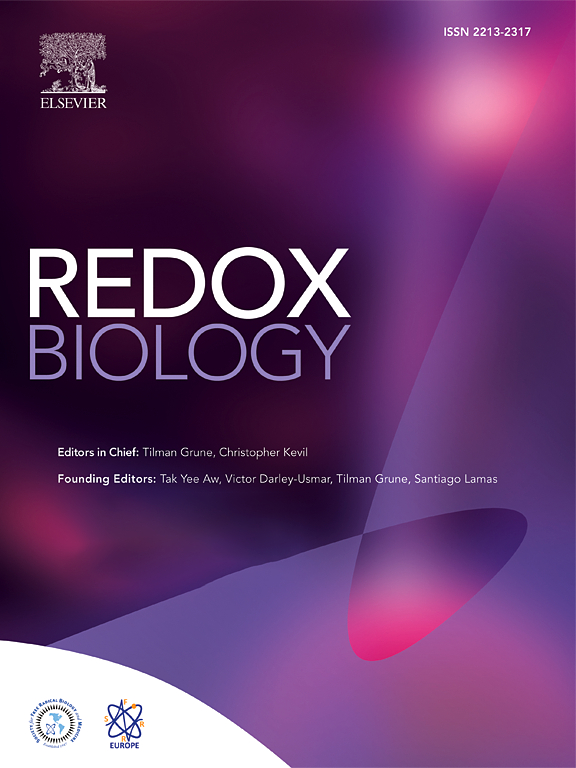核黄素激酶结合并激活诱导型一氧化氮合酶,从而重新规划巨噬细胞的极化。
IF 10.7
1区 生物学
Q1 BIOCHEMISTRY & MOLECULAR BIOLOGY
引用次数: 0
摘要
核黄素激酶(RFK)在核黄素代谢中起着至关重要的作用,它将核黄素转化为黄素单核苷酸(FMN),再进一步转化为黄素腺嘌呤二核苷酸(FAD)。虽然RFK能增强巨噬细胞对李斯特菌的吞噬能力,但其在巨噬细胞极化中的作用却不甚明了。我们的研究发现,在体外和体内,RFK 的缺乏会影响巨噬细胞(IFN-γ)的极化,并促进巨噬细胞(IL-4)的极化。从机理上讲,RFK 与诱导型一氧化氮(NO)合酶(iNOS)相互作用,iNOS 需要 FMN 和 FAD 作为辅助因子才能激活,从而导致 NO 生成增加,并通过抑制三羧酸循环和线粒体电子传递链来改变能量代谢。外源性 FAD 可逆转 RFK 缺乏引起的代谢和极化变化。此外,将喂食高核黄素的小鼠的骨髓移植到野生型肿瘤小鼠体内,可以重编程肿瘤相关巨噬细胞的极化,并抑制肿瘤生长。这些结果表明,靶向 RFK-iNOS 或调节核黄素代谢可能成为治疗巨噬细胞相关免疫疾病的潜在疗法。本文章由计算机程序翻译,如有差异,请以英文原文为准。
Riboflavin kinase binds and activates inducible nitric oxide synthase to reprogram macrophage polarization
Riboflavin kinase (RFK) is essential in riboflavin metabolism, converting riboflavin to flavin mononucleotide (FMN), which is further processed to flavin adenine dinucleotide (FAD). While RFK enhances macrophage phagocytosis of Listeria monocytogenes, its role in macrophage polarization is not well understood. Our study reveals that RFK deficiency impairs M(IFN-γ) and promotes M(IL-4) polarization, both in vitro and in vivo. Mechanistically, RFK interacts with inducible nitric oxide (NO) synthase (iNOS), which requires FMN and FAD as cofactors for activation, leading to increased NO production that alters energy metabolism by inhibiting the tricarboxylic acid cycle and mitochondrial electron transport chain. Exogenous FAD reverses the metabolic and polarization changes caused by RFK deficiency. Furthermore, bone marrow adoptive transfer from high-riboflavin-fed mice into wild-type tumor-bearing mice reprograms tumor-associated macrophage polarization and inhibits tumor growth. These results suggest that targeting RFK-iNOS or modulating riboflavin metabolism could be potential therapies for macrophage-related immune diseases.
求助全文
通过发布文献求助,成功后即可免费获取论文全文。
去求助
来源期刊

Redox Biology
BIOCHEMISTRY & MOLECULAR BIOLOGY-
CiteScore
19.90
自引率
3.50%
发文量
318
审稿时长
25 days
期刊介绍:
Redox Biology is the official journal of the Society for Redox Biology and Medicine and the Society for Free Radical Research-Europe. It is also affiliated with the International Society for Free Radical Research (SFRRI). This journal serves as a platform for publishing pioneering research, innovative methods, and comprehensive review articles in the field of redox biology, encompassing both health and disease.
Redox Biology welcomes various forms of contributions, including research articles (short or full communications), methods, mini-reviews, and commentaries. Through its diverse range of published content, Redox Biology aims to foster advancements and insights in the understanding of redox biology and its implications.
 求助内容:
求助内容: 应助结果提醒方式:
应助结果提醒方式:


